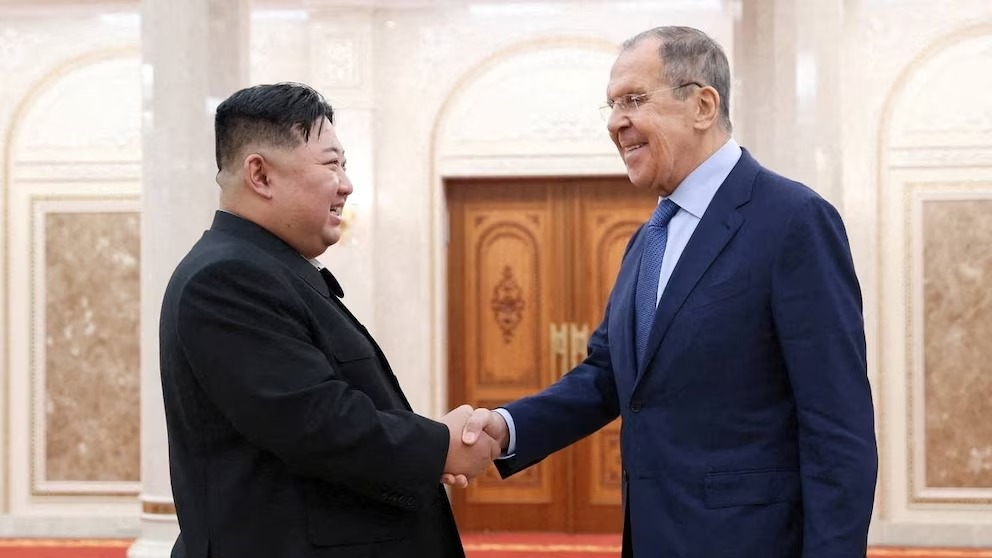Russian Foreign Minister Sergei Lavrov’s rendezvous with North Korean leader Kim Jong Un in Pyongyang is making waves on the global diplomatic stage. As these two nations appear to fortify their relations, it is against the backdrop of growing apprehension toward a perceived hostile and aggressive Western coalition led by the United States.
Closer Ties Between Lavrov and Kim Jong Un
The meeting, which was reported by Russia’s foreign ministry, lasted over an hour, marking a pivotal moment in the evolving relationship between Russia and North Korea. The encounter transpired during Lavrov’s two-day visit to the North Korean capital.
Lavrov’s Expresses Gratitude and Solidarity
Sergei Lavrov, who arrived in Pyongyang on Wednesday, took the opportunity to extend his appreciation to North Korea for its unwavering support of Russia’s military actions in Ukraine. He pledged Moscow’s “complete support and solidarity” for Kim Jong Un. This visit by Lavrov is seen as a significant precursor to a potential visit by Russian President Vladimir Putin, underlining the Kremlin’s deepening cooperation with North Korea.
A Profound Gesture of Support
Lavrov, speaking at a reception hosted by North Korea, emphasized Moscow’s profound appreciation for Pyongyang’s resolute backing during the Ukraine conflict, which Russia characterizes as a “special military operation.” The transcript of his speech, made available on the ministry’s website, reflects his statement: “Likewise, the Russian Federation extends its complete support and solidarity with the aspirations of the DPRK,” referring to the Democratic People’s Republic of Korea.
Growing Concerns Over Increased Military Activities
Following his discussions with North Korean Foreign Minister Choe Son Hui, Lavrov expressed concerns regarding the heightened military activities of the United States and its regional allies, Japan and South Korea. These concerns emerge at a time when the US and South Korean navies, joined by those from Canada, Belgium, New Zealand, and the Philippines, have initiated an anti-naval mine exercise off South Korea’s southern coast. A rare landing of a US B-52 bomber in South Korea further underscores the alliance between the two countries against the escalating nuclear threats posed by North Korea.
Pursuing Regional Stability Through Diplomacy
Lavrov’s comments shed light on the collaborative approach taken by North Korea, China, and Russia as they strive to ease regional tensions. Amidst this backdrop, Lavrov’s visit has been heralded as a “significant occasion” by North Korean state media, further solidifying the relations between Pyongyang and Moscow.
Diplomatic Channels and Regional Activities
This visit by Lavrov comes approximately a month after North Korean leader Kim Jong Un’s rare journey to Russia. During his visit, Kim extended an invitation to President Putin to visit Pyongyang and explored avenues of military cooperation. TASS news agency has also hinted that Lavrov might brief North Korean leaders on the results of Putin’s recent visit to China, reflecting the deepening diplomatic channels within the region.
Continued Activities and International Concerns
On a different note, a US think-tank, the Centre for Strategic and International Studies (CSIS), has reported ongoing activities around a North Korean port near Russia, indicating at least six sea trips between the two countries since late August. These shipments, taking place between the port of Rajin and Russia’s Dunai, are raising questions about the transfer of North Korean munitions to Russia. Simultaneously, the presence of a North Korean cargo-passenger ferry, traditionally used for carrying foreign tourists from Japan or South Korea, in the same port has sparked curiosity. While it is likely for maintenance, it remains to be seen if this vessel will augment trade activities between Russia and North Korea.
The White House’s Concerns
Amidst these diplomatic interactions, the White House expressed concerns over North Korea’s provision of weapons to Russia. This development adds a layer of complexity to the evolving dynamics within this region, as these diplomatic engagements hold the potential to influence geopolitical relations not only regionally but on a global scale.















